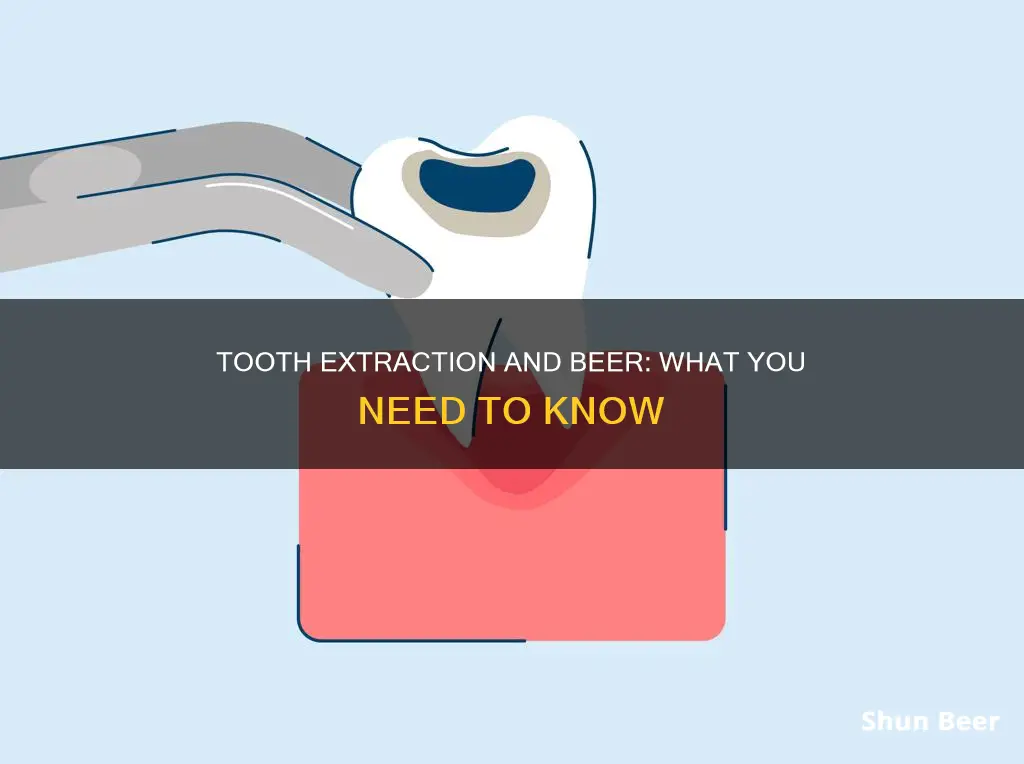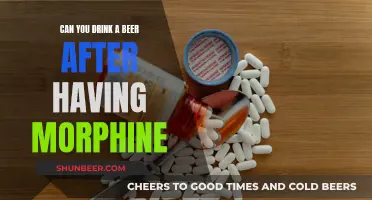
Getting a tooth pulled can be a stressful experience, and it's understandable if you want to relax with a beer afterwards. However, if you want your mouth to heal properly and quickly, it's best to avoid alcohol. Drinking after a tooth extraction can have adverse effects on your recovery, causing pain, infection, and a condition called dry socket.
| Characteristics | Values |
|---|---|
| Should you drink beer after getting a tooth pulled? | No |
| Why? | Alcohol can hinder the formation of a blood clot in the extraction area, leading to a condition called "dry socket" |
| How long should you wait before drinking beer? | 72 hours to 7-10 days |
| What should you drink instead? | Water |
| Why is water better? | Staying hydrated is important for the healing process |
What You'll Learn

Drinking beer after a tooth extraction can slow down recovery
It is not recommended to drink beer or any other alcoholic beverage after a tooth extraction. While it may be tempting to celebrate with a drink after the procedure, it is important to give your body time to heal and recover properly. Here are several reasons why drinking beer after a tooth extraction can slow down your recovery:
Blood Clot Formation
After a tooth extraction, a blood clot needs to form over the extraction site to facilitate proper healing. This process can take up to a week or more. Alcohol consumption can interfere with blood clot formation as it has a blood-thinning effect. If the blood cannot clot properly, you may develop a condition called "dry socket," which occurs when the clot over the wound is dislodged, exposing the underlying nerves and bones.
Pain and Discomfort
Dry socket is a painful condition that can cause extreme discomfort, with pain radiating from the mouth and throughout the face. This can significantly slow down your recovery process and may require additional follow-up visits to your dentist.
Increased Risk of Infection
Dry socket not only causes pain but also increases the risk of bacterial infection. The exposed nerves and bones near the extraction site become vulnerable to infection, which can further hinder the healing process.
Dehydration
Alcohol consumption can lead to dehydration, which is counterproductive to a speedy and healthy recovery. It is crucial to stay hydrated by drinking plenty of water instead of beer or other alcoholic beverages.
Interaction with Medication
It is common for dentists to prescribe painkillers or recommend over-the-counter pain medications to manage post-surgical pain. Mixing these medications with alcohol can be dangerous and have adverse effects on the body, including liver failure, impaired motor function, and dizziness. It is advisable to wait until you no longer need pain medication before resuming alcohol consumption.
Overall Recovery Time
To ensure a smooth and timely recovery, it is recommended to refrain from drinking beer or any alcoholic beverage for at least 72 hours after the procedure. For optimal healing, it is best to wait for about 7 to 10 days, allowing the blood clot to fully form and the extraction site to heal completely.
Beer and Penicillin: A Dangerous Mix?
You may want to see also

Alcohol can cause a dry socket
After a tooth extraction, a blood clot must form in the extraction area to protect the nerves and prevent bacteria from forming. This is a crucial step in the healing process, and it can take a week or more for this to happen.
Research published in 1998 suggested that alcohol has a blood-thinning effect, and this can vary depending on the amount consumed and the type of alcohol. Therefore, drinking alcohol could prevent a clot from forming or cause it to dislodge, leading to a dry socket.
A dry socket is a painful condition where the blood clot over the wound is lost, exposing the nerves underneath. This can cause severe pain and bleeding, and it leaves the bones and nerves vulnerable to bacterial infection. This complication will slow down the healing process and may cause further issues requiring additional dental appointments.
To prevent dry socket, it is recommended to avoid drinking alcohol for at least 72 hours after a tooth extraction, with a longer period of abstinence being preferable. The ideal timeframe is around seven to ten days, allowing the wound to close and heal properly.
In addition to the risk of dry socket, consuming alcohol after a tooth extraction can cause other issues. Alcohol can lead to dehydration, which can cause the blood clot to dry out and dislodge. Alcohol also has an inflammatory effect on oral tissues, reducing the body's ability to produce saliva, which is necessary for healing.
Furthermore, drinking alcohol while taking pain medication can be dangerous, leading to potential side effects such as impaired motor function, liver damage, and dizziness.
For these reasons, it is best to abstain from alcohol until the granulation tissue has formed and the extraction site has healed properly.
Mixing Beer and Benadryl: What You Need to Know
You may want to see also

Mixing alcohol with pain medication can be dangerous
After getting a tooth pulled, it is not recommended to consume alcohol for at least 72 hours, with a recommended wait time of 7 to 10 days. This is because a blood clot needs to form over the extraction site to allow for proper healing. Alcohol can cause a dry socket by thinning the blood and preventing clotting, which can expose nerves and bones to bacteria, leading to infection and pain.
Therefore, it is best to refrain from consuming alcohol until you have completed your prescribed dosage of pain medication and have allowed sufficient time for the extraction site to heal.
Antibiotics and Alcohol: A Risky Mix?
You may want to see also

Alcohol can lead to infection
Drinking alcohol after a tooth extraction is not recommended, as it can negatively impact your recovery and cause other health issues. One of the main reasons is the risk of infection.
When a tooth is extracted, a blood clot must form over the extraction site to initiate the healing process. This typically takes about a week. Alcohol is known to thin the blood and can interfere with the clotting process, preventing the formation of a stable blood clot. If the blood clot becomes dislodged or fails to form, it can lead to a condition called dry socket.
Dry socket is extremely painful and exposes the nerves and bones in the extraction site. This exposure to the underlying nerves and bones increases the risk of bacterial infection. As a result, your mouth becomes more susceptible to pathogens, which can lead to an infection that further slows down the healing process.
In addition to the risk of dry socket, alcohol consumption can also impair your body's ability to fight off potential infections. Alcohol suppresses the immune system, reducing your body's capacity to defend itself against invading bacteria and other pathogens. This suppression can create an environment conducive to infection, particularly in a post-operative context where the body is already working to heal the extraction site.
Furthermore, alcohol can also cause dehydration, which is detrimental to the healing process. Dehydration can hinder the body's ability to recover from the surgery and may create an environment that is more welcoming to harmful bacteria, increasing the risk of infection.
To summarise, alcohol consumption after a tooth extraction can lead to infection by interfering with blood clotting, suppressing the immune system, and causing dehydration. It is crucial to follow your dentist's recommendations and give your body time to heal properly before resuming alcohol consumption.
Ginger Beer and Pregnancy: Is It Safe to Drink?
You may want to see also

Alcohol can cause dehydration
It is not advisable to drink beer or any other alcoholic beverage after getting a tooth pulled. This is because alcohol can cause dehydration, among other issues, which can hinder the healing process.
Alcohol is a diuretic, which means it causes your body to remove fluids from your blood through your renal system (including the kidneys, ureters, and bladder) at a much quicker rate than other liquids. If you don't drink enough water with alcohol, dehydration can occur quickly.
Drinking alcohol on an empty stomach can contribute to dehydration because alcohol enters the bloodstream directly through the blood vessels in the tissue lining of the stomach and small intestine. Eating while drinking alcohol can slow down the absorption of alcohol into the bloodstream.
Other Health Risks of Alcohol
In addition to causing dehydration, alcohol consumption carries other health risks, especially when consumed in large quantities. Here are some reasons why it is not recommended to drink alcohol after a tooth extraction:
- Alcohol can thin your blood, making it harder for a blood clot to form over the extraction site. This can lead to a condition called "dry socket," where the nerves and bones are exposed, increasing the risk of infection and slowing down the healing process.
- Mixing alcohol with pain medication can have serious effects on the body, including impaired motor function, liver failure, and dizziness.
- Alcohol can irritate and cause inflammation in the gastrointestinal (GI) tract, leading to discomfort and GI distress.
- Alcohol can alter the balance of your microbiome, causing bloating, gut and systemic inflammation, and other GI issues.
- Alcohol can negatively impact your sleep quality, leaving you feeling groggy and sleepy during the day.
Beer After a Workout: Good or Bad Idea?
You may want to see also
Frequently asked questions
It is recommended to wait at least 72 hours after the procedure, but ideally, you should wait for 7 to 10 days to allow the wound to heal and the blood clot to form.
Drinking alcohol can hinder the healing process and cause adverse effects on recovery time. It can also increase the risk of developing a condition called "dry socket", where the blood clot is dislodged, exposing nerves and bones and leading to severe pain and infection.
Yes, it is important to stay hydrated during the recovery process, so drinking water is recommended. Other alternatives include milk, strained smoothies, and non-acidic juices.







